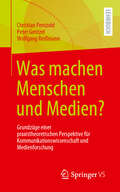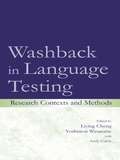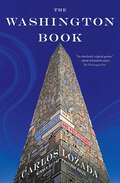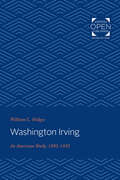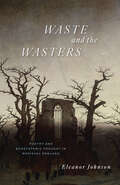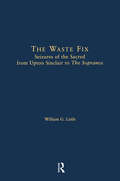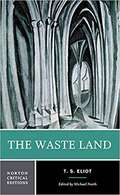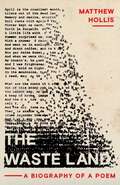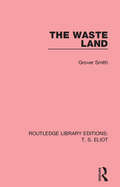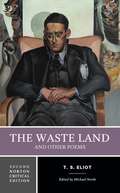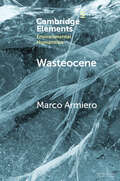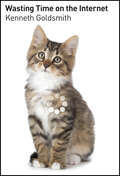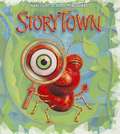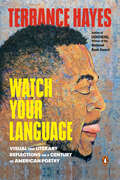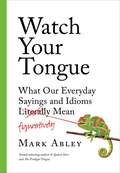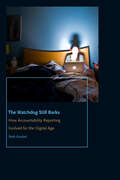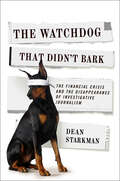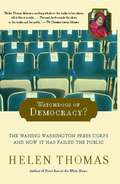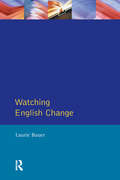- Table View
- List View
Was machen Menschen und Medien?: Grundzüge einer praxistheoretischen Perspektive für Kommunikationswissenschaft und Medienforschung
by Wolfgang Reißmann Christian Pentzold Peter GentzelDie Rede von Praktiken ist in der Kommunikations- und Medienwissenschaft weit verbreitet. Eine systematische Diskussion des Potenzials praxistheoretischer Denk- und Forschungsansätze steht dagegen noch aus. Dieses Buch ist eine Einladung zur tieferen Beschäftigung mit Medienpraktiken und wirbt für eine entsprechende Neuorientierung von Kommunikationsforschung und Medienanalyse. Dazu wird der Status quo praxistheoretischer Ansätze in der Kommunikations- und Medienwissenschaft kompakt vorgestellt. Interessierte bekommen einen Einstieg und Expert:innen werden Anschlussmöglichkeiten angeboten. Es geht sowohl um Grundprinzipien praxistheoretischen Denkens als auch um die sich daraus ergebenden Haltungen sowie um Zugänge für praktische Untersuchungen. Im Zentrum stehen aktuelle Herausforderungen und die Möglichkeiten, Praktiken in Digitalmedien und vernetzten Medienumgebungen zu analysieren.
Washback in Language Testing: Research Contexts and Methods
by Liying Cheng Yoshinori Watanabe Andy CurtisWashback refers to the influence of language testing on teaching and learning. This volume, at the important intersection of language testing and teaching practices, presents theoretical, methodological, and practical guidance for current and future washback studies. In the field of language testing, researchers' major interest has traditionally been focused on issues and solving problems inherent in tests in order to increase their reliability and validity. However, the washback effect goes well beyond the test itself to include factors, such as curriculum, teacher and learner behaviors inside and outside the classroom, their perceptions of the test, and how test scores are used. Only recently have researchers started to empirically investigate the phenomenon of washback. This volume of such research serves two essential purposes by:*providing an overview of the complexity of washback and the various contextual factors entangled within testing, teaching, and learning; and *presenting empirical studies from around the world that offer insights into the effects of washback in specific educational contexts and models of research on which future studies can be based. The extensive use of test scores for various educational and social purposes in society nowadays makes the washback effect a high-interest phenomenon in the day-to-day educational activities of teachers, researchers, program coordinators/directors, policymakers, and others in the field of education. Washback in Language Testing: Research Contexts and Methods is a valuable resource for those who are interested in the application of findings to actual teaching and learning situations or conduct washback research in their own contexts, including educational and psychological testing experts, as well as alternative assessment people in all fields, and for policy- and decision-makers in educational and testing organizations.
The Washington Book: How to Read Politics and Politicians
by Carlos LozadaThe Pulitzer Prize–winning opinion columnist at The New York Times explores how people in power reveal themselves through their books and writings and, in so doing, illuminates the personal, political, and cultural conflicts driving Washington and the nation.As a long-time book critic and columnist in Washington, Carlos Lozada dissects all manner of texts: commission reports, political reporting, Supreme Court decisions, and congressional inquiries to understand the controversies animating life in the capital. He also reads copious books by politicians and top officials: tell-all accounts by administration insiders, campaign biographies by candidates longing for high office, revisionist memoirs by those leaving those offices behind. With this provocative essay collection, Lozada argues that no matter how carefully political figures sanitize their experiences, positions, and records, no matter how diligently they present themselves in the best and safest and most electable light, they almost always let slip the truth. They show us their faults and blind spots, their ambitions and compromises, their underlying motives and insecurities. Whether they mean to or not, they tell us who they really are. In his memoirs and speeches, Barack Obama constantly invoked the power and meaning of his life story, Lozada notes, a sign of how the former president capitalized on his personal symbolism, trying to transform it from inspiration on the campaign trail into an all-purpose governing tool. In a soliloquy about his hair in a self-help book published two decades ago, Donald Trump revealed not just his vanity, Lozada explains, but his utter isolation from the world, long before he entered the bubble of the White House. In deft and lacerating prose, Lozada interprets the unresolved tensions of Hillary Clinton&’s ideological beliefs. He imagines the wonderful memoir George H.W. Bush could have given us but instead left scattered in throughout various books and letters. He explores why Kamala Harris has struggled to carve out a distinctive role as vice president. He explains how Ron DeSantis&’s pitch to America is just a list of enemies. And he even glimpses what Vladimir Putin fears the most, and why he seeks conflict with the West. He does so all through their own books, and their own words. Lozada reads these books so you don&’t have to. The Washington Book is the perfect guide to the state of our politics, and then men and women who dominate the terrain. It explores the construction of personal identity, the delusions of leadership, and that mix of subservience and ambition that can define a life in politics. The more we read the stories of Washington, Lozada contends, the clearer our understanding of the competing visions of our country.
Washington Irving: An American Study, 1802-1832 (Goucher Colloquium)
by William L. HedgesOriginally published in 1965. Despite his prolificacy, Washington Irving remained an underexamined figure among literary scholars at the time William L. Hedges published his definitive study of the author in 1965. Most contemporary scholars believed that Irving's central contribution to the American literary tradition was that his work was "polished" and "suave." These scholars maintained that Irving's aristocratic sensibilities defined the stylistic choices of his literary works. To assume this, Hedges contends, is to "both let the man and the work slip beyond one's grasp." Hedges demonstrates that much of Irving's work can be understood in the context of his conflict between federalist and conservative politics. Irving, in other words, found himself incapable of committing to a coherent set of beliefs or attitudes, and this cultural uneasiness manifested itself in his early work. Washington Irving: An American Study, 1802-1832 tries to correct some of the misapprehension about Irving's place in nineteenth-century American literature.
Waste and the Wasters: Poetry and Ecosystemic Thought in Medieval England
by Eleanor JohnsonA groundbreaking examination of ecological thought in medieval England. While the scale of today’s crisis is unprecedented, environmental catastrophe is nothing new. Waste and the Wasters studies the late Middle Ages, when a convergence of land contraction, soil depletion, climate change, pollution, and plague subsumed Western Europe. In a culture lacking formal scientific methods, the task of explaining and coming to grips with what was happening fell to medieval poets. The poems they wrote used the terms “waste” or “wasters” to anchor trenchant critiques of people’s unsustainable relationships with the world around them and with each other. In this book, Eleanor Johnson shows how poetry helped medieval people understand and navigate the ecosystemic crises—both material and spiritual—of their time.
Waste and the Wasters: Poetry and Ecosystemic Thought in Medieval England
by Eleanor JohnsonA groundbreaking examination of ecological thought in medieval England. While the scale of today’s crisis is unprecedented, environmental catastrophe is nothing new. Waste and the Wasters studies the late Middle Ages, when a convergence of land contraction, soil depletion, climate change, pollution, and plague subsumed Western Europe. In a culture lacking formal scientific methods, the task of explaining and coming to grips with what was happening fell to medieval poets. The poems they wrote used the terms “waste” or “wasters” to anchor trenchant critiques of people’s unsustainable relationships with the world around them and with each other. In this book, Eleanor Johnson shows how poetry helped medieval people understand and navigate the ecosystemic crises—both material and spiritual—of their time.
The Waste Fix: Seizures of the Sacred from Upton Sinclair to the Sopranos (Literary Criticism and Cultural Theory)
by William G. LittleFirst published in 2002. This book explores the philosophical, social, and aesthetic implications of twentieth-century America's obsession with eliminating waste. Through interdisciplinary engagement with fiction and popular culture, William Little traces the way this obsession finds expression in powerful social forces (e.g., the drive to consume conspicuously; the Progressive-era campaign to manage scientifically; the current demand to "reduce, reuse, recycle"), and shows how such forces are governed by an idealism that links proper treatment of waste with the promise of salvation.
The Waste Land (Norton Critical Editions)
by Olaudah Equiano Michael North T. S. EliotThe text of Eliot’s 1922 masterpiece is accompanied by thorough explanatory annotations as well as by Eliot’s own knotty notes, some of which require annotation themselves. <p><p> For ease of reading, this Norton Critical Edition presents The Waste Land as it first appeared in the American edition (Boni & Liveright), with Eliot’s notes at the end. "Contexts" provides readers with invaluable materials on The Waste Land’s sources, composition, and publication history. "Criticism" traces the poem’s reception with twenty-five reviews and essays, from first reactions through the end of the twentieth century. <p><p> Included are reviews published in the Times Literary Supplement, along with selections by Virginia Woolf, Gilbert Seldes, Edmund Wilson, Elinor Wylie, Conrad Aiken, Charles Powell, Gorham Munson, Malcolm Cowley, Ralph Ellison, John Crowe Ransom, I. A. Richards, F. R. Leavis, Cleanth Brooks, Delmore Schwartz, Denis Donoghue, Robert Langbaum, Marianne Thormählen, A. D. Moody, Ronald Bush, Maud Ellman, and Tim Armstrong. A Chronology and Selected Bibliography are included.
The Waste Land: A Biography Of A Poem
by Matthew HollisA riveting account of the making of T. S. Eliot’s celebrated poem The Waste Land on its centenary. Renowned as one of the world’s greatest poems, The Waste Land has been said to describe the moral decay of a world after war and the search for meaning in a meaningless era. It has been labeled the most truthful poem of its time; it has been branded a masterful fake. A century after its publication in 1922, T. S. Eliot’s enigmatic masterpiece remains one of the most influential works ever written, and yet one of the most mysterious. In a remarkable feat of biography, Matthew Hollis reconstructs the intellectual creation of the poem and brings the material reality of its charged times vividly to life. Presenting a mosaic of historical fragments, diaries, dynamic literary criticism, and illuminating new research, he reveals the cultural and personal trauma that forged The Waste Land through the lives of its protagonists—of Ezra Pound, who edited it; of Vivien Eliot, who sustained it; and of T. S. Eliot himself, whose private torment is woven into the seams of the work. The result is an unforgettable story of lives passing in opposing directions and the astounding literary legacy they would leave behind.
The Waste Land (Routledge Library Editions: T. S. Eliot Ser. #8)
by Grover SmithIn this study, first published in 1983, Professor Smith makes the argument that although The Waste Land is analogous in form to a musical composition that it is actually made of its literary echoes. He calls these a ‘music of allusions’ and shows the resemblance of this music in its evocativeness to the technique of Mallarmé and the French symbolists. Smith also comments extensively on Eliot’s critical theories as they bear on The Waste Land and traces the development of Eliot’s allusive and transformational poetic form from its genesis in early work. This title will be of interest to students of literature.
The Waste Land and Other Poems: A Norton Critical Edition (Norton Critical Editions #0)
by T. S. Eliot“This splendid new edition of T. S. Eliot’s The Waste Land will elucidate his legacy for a rising generation of students, teachers, and general readers. The inclusion of poems from Eliot’s first two collections, a substantial selection of background material and scholarship, expert annotation, and Michael North’s learned and incisive introduction detailing the development of Eliot’s poetic coming-of-age make this an invaluable resource.” —Anita Patterson, Boston University This Norton Critical Edition includes: The first American edition of The Waste Land, with Eliot’s notes, joined by Prufrock and Other Poems (1917) and Poems (1920). Updated and expanded introductory materials and footnotes by Michael North. Extensive contextual materials on sources for The Waste Land, its composition, and publication history for all three featured collections. Eleven reviews and reactions to Eliot’s works include those by Ezra Pound, Virginia Woolf, and Ralph Ellison. Five new critical essays examine the themes and legacy of Eliot’s hallmark poems alongside eight classic literary critiques. A chronology and a selected bibliography. About the Series Read by more than 12 million students over fifty-five years, Norton Critical Editions set the standard for apparatus that is right for undergraduate readers. The three-part format—annotated text, contexts, and criticism—helps students to better understand, analyze, and appreciate the literature, while opening a wide range of teaching possibilities for instructors. Whether in print or in digital format, Norton Critical Editions provide all the resources students need. “This splendid new edition of T. S. Eliot’s landmark poem provides an authoritative 1922 edition of the text, the most vital materials for understanding it, and, for this supremely allusive poem, a collection of essential sources. It also brings together Eliot’s most pertinent essays and all the English poems in his earlier books, as well as an illuminating array of reviews and criticism published over the last hundred years.” — Jahan Ramazani, University of Virginia
Wasteocene: Stories from the Global Dump (Elements in Environmental Humanities)
by Marco ArmieroHumans may live in the Anthropocene, but this does not affect all in the same way. How would the Anthropocene look if, instead of searching its traces in the geosphere, researchers would look for them in the organosphere, in the ecologies of humans in their entanglements with the environment? Looking at this embodied stratigraphy of power and toxicity, more than the Anthropocene, we will discover the Wasteocene. The imposition of wasting relationships on subaltern human and more-than-human communities implies the construction of toxic ecologies made of contaminating substances and narratives. While official accounts have systematically erased any trace of those wasting relationships, another kind of narrative has been written in flesh, blood, and cells. Traveling between Naples (Italy) and Agbogbloshie (Ghana), science fiction and epidemic outbreaks, this Element will take the readers into the bowels of the Wasteocene, but it will also indicate the commoning practices which are dismantling it.
Wasting Time on the Internet
by Kenneth GoldsmithUsing clear, readable prose, conceptual artist and poet Kenneth Goldsmith’s manifesto shows how our time on the internet is not really wasted but is quite productive and creative as he puts the experience in its proper theoretical and philosophical context.Kenneth Goldsmith wants you to rethink the internet. Many people feel guilty after spending hours watching cat videos or clicking link after link after link. But Goldsmith sees that “wasted” time differently. Unlike old media, the internet demands active engagement—and it’s actually making us more social, more creative, even more productive.When Goldsmith, a renowned conceptual artist and poet, introduced a class at the University of Pennsylvania called “Wasting Time on the Internet”, he nearly broke the internet. The New Yorker, the Atlantic, the Washington Post, Slate, Vice, Time, CNN, the Telegraph, and many more, ran articles expressing their shock, dismay, and, ultimately, their curiosity. Goldsmith’s ideas struck a nerve, because they are brilliantly subversive—and endlessly shareable.In Wasting Time on the Internet, Goldsmith expands upon his provocative insights, contending that our digital lives are remaking human experience. When we’re “wasting time,” we’re actually creating a culture of collaboration. We’re reading and writing more—and quite differently. And we’re turning concepts of authority and authenticity upside-down. The internet puts us in a state between deep focus and subconscious flow, a state that Goldsmith argues is ideal for creativity. Where that creativity takes us will be one of the stories of the twenty-first century.Wide-ranging, counterintuitive, engrossing, unpredictable—like the internet itself—Wasting Time on the Internet is the manifesto you didn’t know you needed.
Watch Your Language: Visual and Literary Reflections on a Century of American Poetry
by Terrance HayesFrom the National Book Award–winning author of Lighthead, Terrance Hayes, a fascinating collection of graphic reviews and illustrated prose addressing the last century of American poetry—to be published simultaneously with his latest poetry collection, So to SpeakCanonized, overlooked, and forgotten African American poets star in Terrance Hayes's brilliant contemplations of personal, canonical, and allegorical literary development. Proceeding from Toni Morrison's aim to expand the landscape of literary imagination in Playing in the Dark ("I want to draw a map, so to speak, of a critical geography"), Watch Your Language charts a lyrical geography of reading and influence in poetry. Illustrated micro-essays, graphic book reviews, biographical prose poems, and nonfiction sketches make reading an imaginative and critical act of watching your language. Hayes has made a kind of poetic guidebook with more questions than answers. "If you don't see suffering's potential as art, will it remain suffering?" he asks in one of the lively mock poetry exam questions of this musing, mercurial collection. Hayes's astonishing drawings and essays literally and figuratively map the acclaimed poet's routes, roots, and wanderings through the landscape of contemporary poetry.
Watch Your Tongue: What Our Everyday Sayings and Idioms Figuratively Mean
by Mark AbleyPhrases, idioms, and clichés—why do we say the things we say? Watch Your Tongue explores weird and wonderful everyday sayings and what they reveal about us.Do you ever wonder why you shouldn’t have a cow but you should seize a bull by its horns? Who has the better reputation in language—cats or dogs? Do you sometimes feel that our speech is all smoke and mirrors or that our expressions simply make no sense? In Watch Your Tongue, award-winning author Mark Abley explores the phrases, idioms, and clichés of our everyday language. With wit and subtle wisdom, he unravels the mysteries of these expressions, illuminating the history, tradition and stories behind everything we say. Pulling examples from Shakespeare’s plays to sports team names, ancient Rome to Twitter, Abley shares samples and anecdotes of the eccentric ways that we play with, parse, and pattern language. Why do so many companies use fruit for their brand names? What do politicians mean when they say they’re going to “drain the swamp”? Why does English use chickens to signify cowardice? Abley dives into the history and psychology behind these examples and countless others, unpacking their significance (and sheer absurdity) to show how our language developed, where it is headed, and what we can learn about ourselves from it. Whimsically illustrated, easily browsable, and full of catchy sidebars, Watch Your Tongue celebrates how we amuse ourselves with words and what our sayings reveal about the way we see the world.
The Watchdog Still Barks: How Accountability Reporting Evolved for the Digital Age (Donald McGannon Communication Research Center's Everett C. Parker Book Series)
by null Beth KnobelPerhaps no other function of a free press is as important as the watchdog role—its ability to monitor the work of the government. It is easier for politicians to get away with abusing power—wasting public funds and making poor decisions—if the press is not shining its light with what is termed “accountability reporting.” This need has become especially clear in recent months, as the American press has come under virulent direct attack for carrying out its watchdog duties. Upending the traditional media narrative that watchdog accountability journalism is in a long, dismaying decline, The Watchdog Still Barks presents a study of how this most important form of journalism came of age in the digital era at American newspapers.Although the American newspaper industry contracted significantly during the 1990s and 2000s, Fordham professor and former CBS News producer Beth Knobel illustrates through empirical data how the amount of deep watchdog reporting on the newspapers’ studied front pages generally increased over time despite shrinking circulations, low advertising revenue, and pressure to produce the kind of soft news that plays well on social media. Based on the first content analysis to focus specifically on accountability journalism nationally, The Watchdog Still Barks examines the front pages of nine newspapers located across the United States to paint a broad portrait of how public service journalism has changed since 1991 as the advent of the Internet transformed journalism. This portrait of the modern newspaper industry shows how papers of varying sizes and ownership structures around the country marshaled resources for accountability reporting despite significant financial and technological challenges.The Watchdog Still Barks includes original interviews with editors who explain why they are staking their papers’ futures on the one thing that American newspapers still do better than any other segment of the media: watchdog and investigative reporting.
The Watchdog That Didn't Bark: The Financial Crisis and the Disappearance of Investigative Journalism (Columbia Journalism Review)
by Dean StarkmanThe Pulitzer Prize-winning reporter details &“how the U.S. business press could miss the most important economic implosion of the past eighty years&” (Eric Alterman, media columnist for The Nation). In this sweeping, incisive post-mortem, Dean Starkman exposes the critical shortcomings that softened coverage in the business press during the mortgage era and the years leading up to the financial collapse of 2008. He examines the deep cultural and structural shifts—some unavoidable, some self-inflicted—that eroded journalism&’s appetite for its role as watchdog. The result was a deafening silence about systemic corruption in the financial industry. Tragically, this silence grew only more profound as the mortgage madness reached its terrible apogee from 2004 through 2006. Starkman frames his analysis in a broad argument about journalism itself, dividing the profession into two competing approaches—access reporting and accountability reporting—which rely on entirely different sources and produce radically different representations of reality. As Starkman explains, access journalism came to dominate business reporting in the 1990s, a process he calls &“CNBCization,&” and rather than examining risky, even corrupt, corporate behavior, mainstream reporters focused on profiling executives and informing investors. Starkman concludes with a critique of the digital-news ideology and corporate influence, which threaten to further undermine investigative reporting, and he shows how financial coverage, and journalism as a whole, can reclaim its bite. &“Can stand as a potentially enduring case study of what went wrong and why.&”—Alec Klein, national bestselling author of Aftermath &“With detailed statistics, Starkman provides keen analysis of how the media failed in its mission at a crucial time for the U.S. economy.&”—Booklist
Watchdogs of Democracy?
by Helen ThomasIn the course of more than sixty years spent covering Washington politics, Helen Thomas has witnessed a raft of fundamental changes in the way news is gathered and reported. Gone are the days of frequent firsthand contact with the president. Now, the press sees the president only at tightly controlled and orchestrated press conferences. In addition, Thomas sees a growing -- and alarming -- reluctance among reporters to question government spokesmen and probe for the truth. The result has been a wholesale failure by journalists to fulfill what is arguably their most vital role in contemporary American life -- to be the watchdogs of democracy. Today's journalists, according to Thomas, have become subdued, compromised lapdogs. Here, the legendary journalist and bestselling author delivers a hard-hitting manifesto on the precipitous decline in the quality and ethics of political reportage -- and issues a clarion call for change. Thomas confronts some of the most significant issues of the day, including the jailing of reporters, the conservative swing in television news coverage, and the administration's increased insistence on "managed" news. But she is most emphatic about reporters' failure to adequately question President George W. Bush and White House spokesmen about the lead-up to the invasion of Iraq, and on subjects ranging from homeland security to the economy. This, she insists, was a dire lapse. Drawing on her peerless knowledge of journalism, Washington politics, and nine presidential administrations, as well as frank interviews with leading journalists past and present, Thomas provides readers with a rich historical perspective on the roots of American journalism, the circumstances attending the rise and fall of its golden age, and the nature and consequences of its current shortcomings. The result is a powerful, eye-opening discourse on the state of political reportage -- as well as a welcome and inspiring demand for meaningful and lasting reform.
Watching English Change: An Introduction to the Study of Linguistic Change in Standard Englishes in the 20th Century (Learning about Language)
by Laurie BauerExamines the ways language has changed in the twentieth century. It concentrates on standard English and takes a historical rather than sociolinguistic view of the changes which have occurred.
